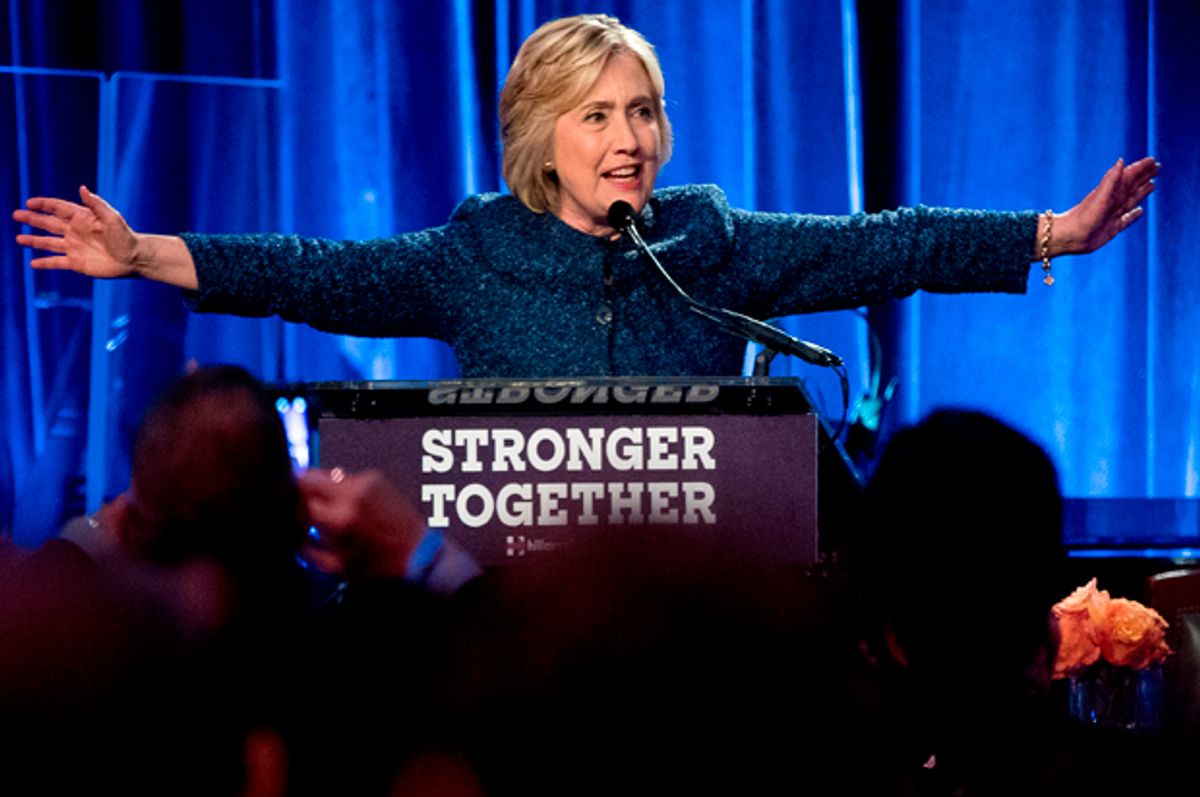Hillary Clinton's popular vote margin over Donald Trump has now exceeded 2 million.
According to a Politico report on Wednesday, Clinton has garnered 64,223,958 votes while Trump has only picked up 62,206,395 votes. According to the Cook Political Report (from which Politico garnered this information), this means Clinton has 48.1 percent of all the popular votes cast compared to 46.6 percent for Trump. Despite these sizable popular vote gap, however, Trump defeated Clinton in the electoral college, 306 to 232.
Even Trump's electoral college lead could fall somewhat, as New York Times reporter Jonathan Weisman pointed out.
Assuming Clinton's popular vote margins remain roughly the same as they are right now, it will put the Trump-Clinton election in a very interesting context when compared to other presidential elections from the last 40 years. They have been ranked from the largest margin of victory to the smallest.
1984: Ronald Reagan over Walter Mondale - 54,455,472 (58.8 percent) to 37,577,352 (40.6 percent), 18.2 point margin of victory
1980: Ronald Reagan over Jimmy Carter - 43,903,230 (50.8 percent) to 35,480,115 (41.0 percent), 9.8 point margin of victory
1996: William Clinton over Robert Dole - 47,400,125 (49.2 percent) to 39,198,755 (40.7 percent), 8.5 point margin of victory
1988: George H. W. Bush over Michael Dukakis - 48,886,597 (53.4 percent) to 41,809,476 (45.7 percent), 7.7 point margin of victory
2008: Barack Obama over John McCain - 69,499,428 (52.9 percent) to 59,950,323 (45.6 percent), 7.3 point margin of victory
1992: William Clinton over George H. W. Bush - 44,909,806 (43.0 percent) to 39,104,550 (37.5 percent), 5.5 point margin of victory
2012: Barack Obama over Mitt Romney - 65,918,507 (51.0 percent) to 60,934,407 (47.2 percent), 3.8 point margin of victory
2004: George W. Bush over John Kerry - 62,039,572 (50.7 percent) to 59,027,115 (48.3 percent), 2.4 point margin of victory
1976: Jimmy Carter over Gerald Ford - 40,831,881 (50.1 percent) to 39,148,634 (48.0 percent), 2.1 point margin of victory
2016: Hillary Clinton over Donald Trump - 64,223,958 (48.1 percent) to 62,206,395 (46.6 percent), 1.5 point margin of victory
2000: Albert Gore over George W. Bush - 51,009,810 (48.4 percent) to 50,462,412 (47.9 percent), 0.5 point margin of victory
The most notable detail here is that the Bush-Gore and Trump-Clinton elections had the closest popular vote margins within the last forty years; indeed, the last elections to be as close as either of them occurred in the 1960s (John Kennedy over Richard Nixon in 1960 and Richard Nixon over Hubert Humphrey in 1968). While this doesn't entirely explain how Gore and Clinton could both win the popular vote while losing the electoral college, it does shed light on the mathematics that make such a discrepancy statistically possible in the first place.
In terms of popular vote margins, Clinton's "victory" over Trump falls well below the numbers posted by Ronald Reagan in 1980 and 1984, George H. W. Bush in 1988, Bill Clinton in 1992 and 1996, or Barack Obama in 2008 and 2012.
On the other hand, it exceeds the 1.7 million votes separating Carter from Ford in 1976 and is close to matching the 2.1 percent spread in that election.
Clinton's lead exceeds the more than 500,000 votes separating Gore from Bush in 2000 as well as the 0.5 percent spread that year. If it grows much more, could rival the 3 million vote and 2.4 percent margin separating Bush from Kerry in 2004.
While Clinton will be the second presidential candidate to win the popular vote without the electoral college in less than 20 years, that phenomenon has happened on three other occasions in American history. In 1824, John Q. Adams lost the popular vote to Andrew Jackson, 113,142 to 151,363 (30.9 percent to 41.4 percent). In 1876, Rutherford Hayes lost the popular vote to Samuel Tilden, 4,034,142 to 4,286,808 (47.9 percent to 50.9 percent). And in 1888 Benjamin Harrison lost the popular vote to Grover Cleveland, 5,443,633 to 5,538,163 (47.8 percent to 48.6 percent).
Although Adams and Jackson were both running as candidates in the Democratic-Republican Party (which briefly became the only major party in the United States during the 1820s), every other popular vote winner who has lost the presidential election has been a Democrat — Tilden in 1876, Cleveland in 1888, Gore in 2000, and now Clinton in 2016.



Shares